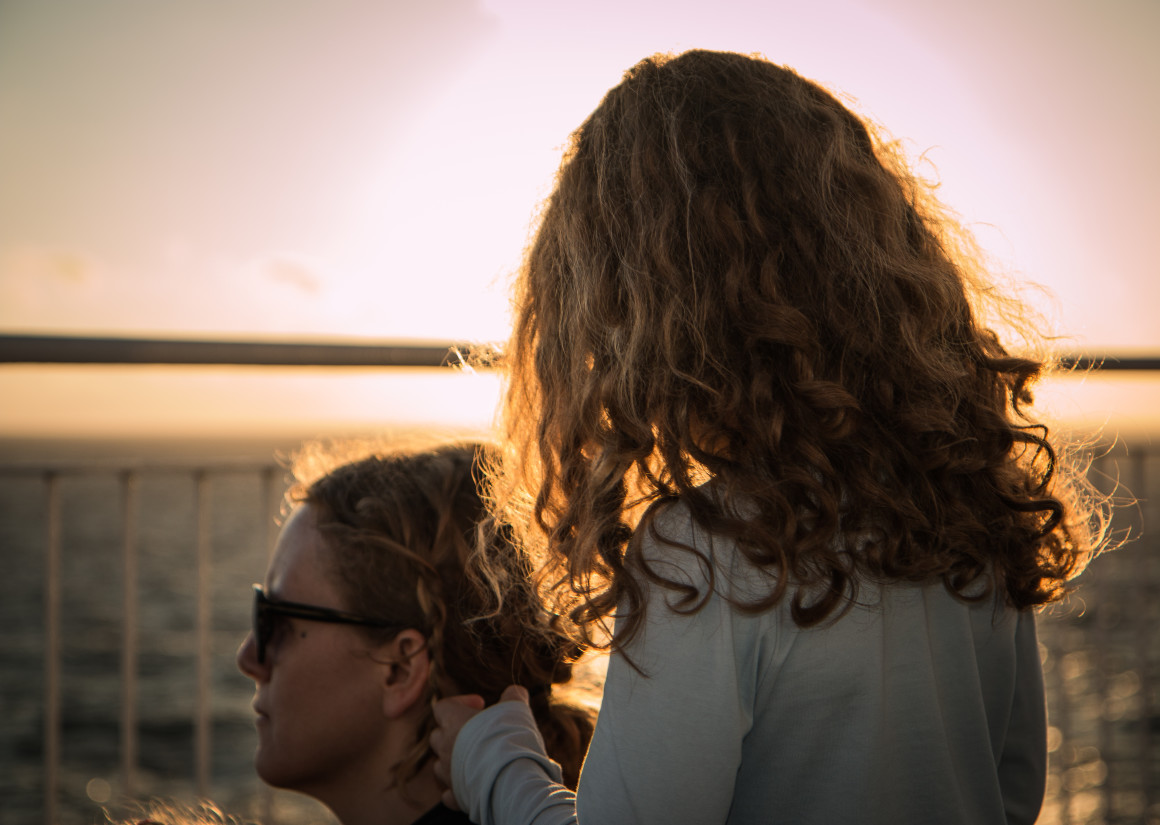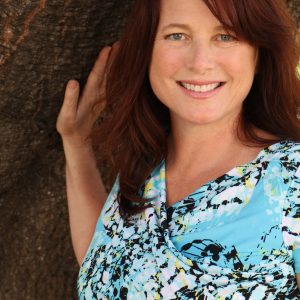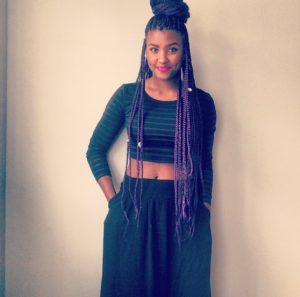My fingers slide through the soft waves of my mother’s charcoal grey hair and she leans into my touch. I know her head by heart, and I massage her scalp before lightly scraping my nails over the sensitive skin. When I was a little girl I memorized the exact shape of her skull, the graceful curve of her neck, and the way the bones of her jaw look from behind. I memorized the smell of her hair and the oil from her scalp. I always hoped I’d be as pretty as she was when I grew up.
As a child, my hands twisted and shaped my mother’s hair into every imaginable configuration. I loved to run my hands through the glorious thickness of her platinum blonde tresses, imagining that it was my hair. Sometimes I would hold her hair up to my face and look in a hand mirror to imagine what I would look like if I could be my mom. I thought she was the prettiest woman I knew. I remember bringing home a magazine picture of Marilyn Monroe when I was in third grade and saying, “Look mommy, this lady looks like you!”
When I bored with tying her hair up, pulling it back, or sectioning it into braids, she would hand me her brush and ask me to brush it for a while, not complaining when I yanked at knots I had created. I would huff and puff, just wanting to watch TV and feeling like I couldn’t say no to her. The more she asked, the more I resented it, not understanding that my mother was starved for touch. Not knowing that 30 years later this little ritual would be the bridge we would carefully build across the chasm that had opened up in our relationship.
Tonight I ask my mother if she would like me to rub her head and shoulders, and she smiles at me before carefully sitting her small frame before me and baring the vulnerable skin of her back. I check to make sure she’s not any thinner than she was during my last visit. She can’t afford to lose any more weight, but it’s hard to maintain when her only sustenance is through a feeding tube. She seems to be holding onto her 95 pounds. I notice that the discoloration of her skin is starting to improve and it doesn’t feel as dry as it has the past couple of months. I had no idea the effects of radiation on skin would last as long as they have. But as always my attention returns to her hair, and I find that I’m still not used to how she looks now. The color is grey, which is different enough, but since she lost it all to chemo, her straight hair has grown back curly and coarse. This is a normal side effect, we’re told, but it’s still disorienting.
She didn’t tell me about the cancer for two years. She didn’t even tell her doctor. She felt the tumor growing in her body and chose not to deal with it. By the time she told me, the tumor could no longer be ignored. She was two months into chemo when she finally returned the phone calls I had been making and she had been ignoring.
The truth is that, at the beginning, I was relieved each time I left a message and she didn’t answer. I was relieved that I didn’t have to pretend to be interested in the mundane details of her life or share tidbits of my life that were banal enough they couldn’t be used as ammunition to hurt me. I was relieved that I didn’t have to pretend not to be angry for the years of criticism I’d felt from her, or the way she had of dismissing my experience, emotions, and values. It was easier not to talk to her than to be reminded in subtle or not-so-subtle ways that I am not the daughter she wanted and that she disagrees with nearly every life decision I’ve made.
But worry, and finally alarm, set in when I didn’t hear from her at all. I called my aunt to see if she knew anything. She said my mom planned to call me in the next two days and then she wouldn’t say anything else. The message was odd and I realized I was not just puzzled, I was scared.
When I picked up the phone, after seeing my mother’s number on caller ID, I couldn’t understand why it sounded as if she had her mouth full. I didn’t realize yet that she actually did. The tumor was pushing up under her tongue and she could hardly talk around the mass of it. She calmly told me of the cancer, repeating her words slowly when I couldn’t understand them. I numbly listened, not believing, not feeling. I vaguely wondered when the last time was that I saw her. The three-hour distance no longer seemed a good enough excuse for my prolonged absence. I told her I’d come the next day.
 The drive to Fresno was long and not long enough. I tried to prepare myself for what I might find when I arrived. I cried my heart out for the lost time, broken promises, and unmet expectations. I was scared to death of seeing her for the first time. She tried to prepare me on the phone. “They pulled all my teeth and I can’t wear dentures. My hair is falling out from the chemo and my jaw is swollen. I look like a mess.” I couldn’t imagine it. I was afraid to imagine it.
The drive to Fresno was long and not long enough. I tried to prepare myself for what I might find when I arrived. I cried my heart out for the lost time, broken promises, and unmet expectations. I was scared to death of seeing her for the first time. She tried to prepare me on the phone. “They pulled all my teeth and I can’t wear dentures. My hair is falling out from the chemo and my jaw is swollen. I look like a mess.” I couldn’t imagine it. I was afraid to imagine it.
And suddenly the drive was over. I pulled my car up in front of her house and busied myself with unloading my suitcase and work materials, heart pounding madly while I tried to act normal. I felt awkward, like my limbs were too long and I couldn’t get my balance right. She met me at the front door and I took a deep breath and smiled at her. I had promised myself I would not flinch, regardless of what she looked like, but there was no way I could be prepared for what I saw. My mother’s beautiful face was disfigured by the cancer that was trying to eat her life away. The child in me began to cry. I hugged her, hoping she would not see the tears in my eyes. She felt so tiny in my arms and seemed so old in that moment. I could hardly believe this was my mother.
During that visit she filled in the details that she did not tell me on the phone. The cancer was stage IV and the specialists wanted to remove her lower jaw and tongue to give her the best chance to beat it. But even with such radical surgery and reconstruction, she only had a 50 percent chance of survival over five years. Without the surgery, her chances dropped to 40 percent. She opted out of surgery and decided that the palliative use of chemotherapy and radiation was the only treatment she would seek. She told me the cancer would likely kill her. The doctors had said they expected the tumor to shrink but there was likely no chance it would disappear, and it might spread to other areas of her body.
In those conversations over the next four days, I kept asking her how she felt, but she shrugged it off. “There’s no point in dwelling on it. I’m just taking the next step and we’ll see.” This was not surprising to me. My family has always been the “pull yourself up by the bootstraps” sort. We don’t talk about our feelings, fears, or pain. We move on as though we are made of tougher stuff. But the inability to make space for feelings within the family system proved to be its undoing. We are all strangers to each other, preferring work over deeply relating to loved ones.
Some say that illness has its roots in emotional wounding. According to Louise Hay in her book “You Can Heal Your Life,” mouth problems are linked specifically to having set opinions, a closed mind, and the incapacity to take on new ideas. That describes my mother rather accurately. I would say that my mother is choking on a lifetime’s worth of opinions, judgments, and criticisms. Hay goes on to describe cancer as representing deep hurt, longstanding resentment, deep secrets, and/or hatreds or grief eating away at the self. I suspect that this description is also true of my mother, though it is not something she ever talks about. Whether Hay is right or not, I felt the ring of truth in that message for myself as well. As I looked at the effect of cancer on her ravaged body, I could imagine the ocean of grief and resentment that I carried for so many years being enough to eat away at me, and that scared me badly.
When I found out about my mother’s diagnosis, I decided to see a therapist. I was clear that in order to be at my mother’s side I needed to work through the things that had kept us apart over the years. She would need all of her energy and strength to fight the cancer, and I would need to work through my issues on my own. I remember sitting down with the therapist and telling her what was happening. I talked of my conflicted feelings for my mother, both the love and the anger I felt. I always thought we’d have time to build a better relationship, that one day she would understand me. I was angry with her for bailing out on what I saw as years of healing that needed to be done. Leaving me holding the bag. I wanted vindication for never feeling her unconditional approval and love. I wanted her to come to me and say she was wrong and to plead with me to forgive her.
But above all, I found that I wanted my mom to live long enough for me to forgive her for not being the mother I wanted and to forgive myself for not being the daughter she wanted. And so that’s what I vowed to do: sift through everything that stood in the way of that forgiveness. To stop feeding the very things that kept me angry and resentful. To give myself permission to feel my grief fully. And then to finally just be who I was and give her permission to be who she was. The pain and the anger were so strong. As was the grief of preparing to lose her. My heart cried out and the little girl in me wept for her mommy.
 For a long time I didn’t know how to be with her. I didn’t know what to say, what she wanted from me. I felt so inadequate and had to sit with that feeling for hours as we watched TV in silence. On days she didn’t feel good she was more likely to say something offensive, and I would bite my tongue and try to let it pass through me and not engage or argue. I became really good at carefully changing the subject. Then one day I noticed that she caught her own comment and made an effort to reframe it. She started to be less offensive, critical, and judgmental. We were both turning toward the relationship, seeking shared interests and commonalities that might weave a truce, rather than crouching behind our usual bunkers watching each other across the battleground. I began to think of it as the time of mutually cautious disarmament. We tiptoed around subjects that might cause a sudden break in the cease-fire: politics, religion, global warming, gay rights, parenting theory, socioeconomic and racial topics, the Pacific Ocean garbage patch, whether or not I should continue dyeing my hair red.
For a long time I didn’t know how to be with her. I didn’t know what to say, what she wanted from me. I felt so inadequate and had to sit with that feeling for hours as we watched TV in silence. On days she didn’t feel good she was more likely to say something offensive, and I would bite my tongue and try to let it pass through me and not engage or argue. I became really good at carefully changing the subject. Then one day I noticed that she caught her own comment and made an effort to reframe it. She started to be less offensive, critical, and judgmental. We were both turning toward the relationship, seeking shared interests and commonalities that might weave a truce, rather than crouching behind our usual bunkers watching each other across the battleground. I began to think of it as the time of mutually cautious disarmament. We tiptoed around subjects that might cause a sudden break in the cease-fire: politics, religion, global warming, gay rights, parenting theory, socioeconomic and racial topics, the Pacific Ocean garbage patch, whether or not I should continue dyeing my hair red.
On this night I look at my hands as they pass over her shoulders and suddenly see my hands as they were when I was a child, superimposed on my now 44-year-old hands. I find that coming to terms with my mother’s aging and mortality has helped me come to terms with my own. Just as forgiving my mother for being human has allowed me to forgive myself for the same.
She leans into my hands and allows herself to revel in the pleasure. I hear her sigh. This is our ritual for 30 minutes every night that I am with her, and I no longer resent it like I did as a child. These moments are precious to me, this simple act of being present with my mother. I know that these moments are limited, that one day she will die from cancer or something else. But for now I have my mom and the luxury of giving her the touch and care she so desperately needs and craves. I never thought it would take cancer and the threat of death to heal my relationship with her, and while I cannot say that I am grateful for the cancer, I am grateful that we both used this experience as an opportunity to find each other and to create this precious and simple bond.
Photos (top to bottom): "French Plait" photo by Barney Moss from Flickr (CC), "The Road" by Flavio Sarescia from Flickr (CC), "Silence" by Milena Miyaylova from Flickr (CC).






